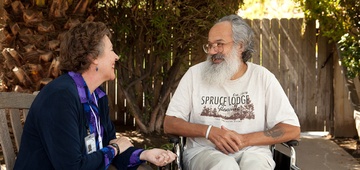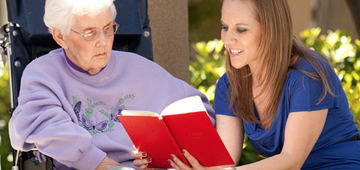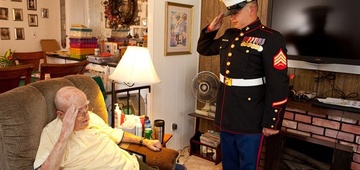How to Speak about Hospice
At LightBridge, we recognize that when a physician has a hospice conversation with your patient and family members, it’s more than a directive --- it is, more often than not, a difficult and time-consuming end-of-life discussion. The following recommendations can help with the discussion about hospice and what it can do for the patient and family.
Encourage the family members to ask questions.
This will, obviously, require that you are able to allow time for questions. A daughter of a hospice patient recently shared her experience. “It’s important to know as much as you want to know about what’s going on with your loved one. No one has a “crystal ball” to know\s exactly what is going to happen or when, but the hospice staff can give a reasonable idea of what to expect. That way you can be as prepared as possible.”
We’ve learned to remember that most families have not been through this experience before and it is unreasonable to expect them to handle things well. Having 24/7 support from hospice nurses can ease anxiety. “That was the best part for me. I never had to guess if what I was doing was right. I could just call the nurse. There was always someone available to answer my questions,” explains the wife of a hospice patient.
Advise the family that hospice services are for them, too.
Our CEO is fond of reminding people that hospice is the only healthcare benefit that is designed to meet the needs of both patients and their families. The interdisciplinary team, including the nurse, social worker and spiritual care counselor, is there to help every patient and family navigate through challenging emotions, family dynamics and difficult decisions.3) Suggest that the family takes time to adjust to the hospice team.
Some families are unaccustomed to having frequent visitors to their homes. The flurry of new nurses, social workers, home health aides, chaplains and volunteers can be overwhelming, especially in the first weeks of receiving hospice care. They sometmes have to rearrange their home to accommodate new equipment and supplies to help provide care for the hospice patient. That equates to a lot of change in a short period of time. We like to encourage caregivers and family to allow themselves time to adjust. It usually becomes easier after a couple of weeks when things settle a little, family members get to know the hospice staff and together they establish a bit of a routine.
It’s okay to accept help … and it’s okay to ask for help.
When friends and family members learn that you are caring for someone receiving hospice services, they may offer to help in some way. Don’t assume that you are burdening them. Sometimes others are helped by knowing they can do something for the hospice patient and family.
.
Some caregivers feel overwhelmed with offers of assistance, while others feel like they are all alone in caring for the hospice patient. A spouse of a hospice patient recalls how her family and friends , concered about being intrusive, were reluctant to offer help but glad to help when asked She explains that at first she just waited for someone to offer help but when it didn’t come , she started making specific requests for assistance. She discovered that they were eager to help but just hadn’t know what to do.
Utilize hospice volunteers.
Volunteers are important members of the hospice team and they have a meaningful and lasting impact on patients and families for whom they care. Volunteers help in a variety of ways, including socializing with hospice patients, helping with various daily tasks and activites, or simply sitting with patients while caregivers run errands or take much needed breaks.
One of our volunteers is fond of explaining that her goal is always to be her patient’s last best friend. A widow of a hospice patient explains “I loved my husband, and I wanted to be there for him, but I came to realize that we were driving each other crazy being around each other 24 hours a day! The volunteer’s visits were an important break for both of us.”
Instruct caregivers to take care of themselves.
While caregivers are busy taking care of others, they often become ill because they fail to care for themselves -- something easier said than done, especially when someone is as busy as caregivers typically are. Explain to caretakers that they can benefit greatly from small breaks, such as taking a long bath, phoning a friend, working in the garden or taking a walk. For those caregivers who prefer to stick close to home, suggest they consider a two-way home monitor.
Caregivers need their sleep.
An important part of caring for themselves is getting sufficient sleep. If a caregiver is simply unable to to rest well at night, suggest they arrange for someone to come over during the day to allow them to take a nap. If, on the other hand, a caregiver has to be up several times during the night to give medications and care, they should talk to their hospice nurse. If neither the patient nor caregiver are sleeping well, it’s possible that changes need to be made to the care plan.
Advise caregivers to set healthy limits.
Sometimes staying involved in activities is helpful and serves as a break from care giving responsibilities; however, caregivers may need to take a leave of absence from certain tasks or say no to certain things. They will find that others are eager to step in to help while the caregiver who is attending to a loved one.
All family members and caregivers should experience joy.
Just because some is dying doesn’t mean that it is impossible or inappropriate to experience happiness. As we share in our mission statement, at its best, this is a time to “celebrate what has brought joy and come to a sense of peace about whatever the future holds.”
Suggestions for recommending hospice
• “I think that hospice would be your best choice right now, but of course the final decision is yours.”
• “Hospice could be very helpful to you in the ways that we’ve talked about, but I realize it’s a big decision. I’d like to arrange for a hospice nurse to visit you so you can decide for yourself whether hospice is right for you.”



